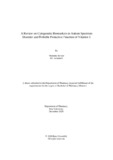A review on Cytogenetic Biomarkers in Autism Spectrum Disorder and Probable Protective Function of Vitamin E

View/
Date
2020-12Publisher
Brac UniversityAuthor
Sarwar, MuntahaMetadata
Show full item recordAbstract
Autism spectrum disorder (ASD) is a neurodevelopmental disorder with impaired sociability,
disabled verbal and nonverbal interaction and repetitive or restrictive stereotypical behaviors.
According to some assessments, worldwide, 1 in 160 children are affected by ASD. About
90% individuals have idiopathic autism and all responsible genes have not been found yet.
Since treatment options for ASDs are very limited, clinical indicators like biomarkers offer
greater significance on ASDs as a treatment choice. A variety of cytogenetic biomarkers have
been addressed in this comprehensive review study in order to examine the hypothesis that
ASD is more than 90% susceptible to genetics and many cytogenetic modifications contribute
to the development of ASD. In addition to that, this study also addressed the antioxidant
property of vitamin E to stabilize the genetic material. These biomarker findings may have
important implications for patients and their families with respect to etiological diagnosis,
genetic therapy and patient care.
